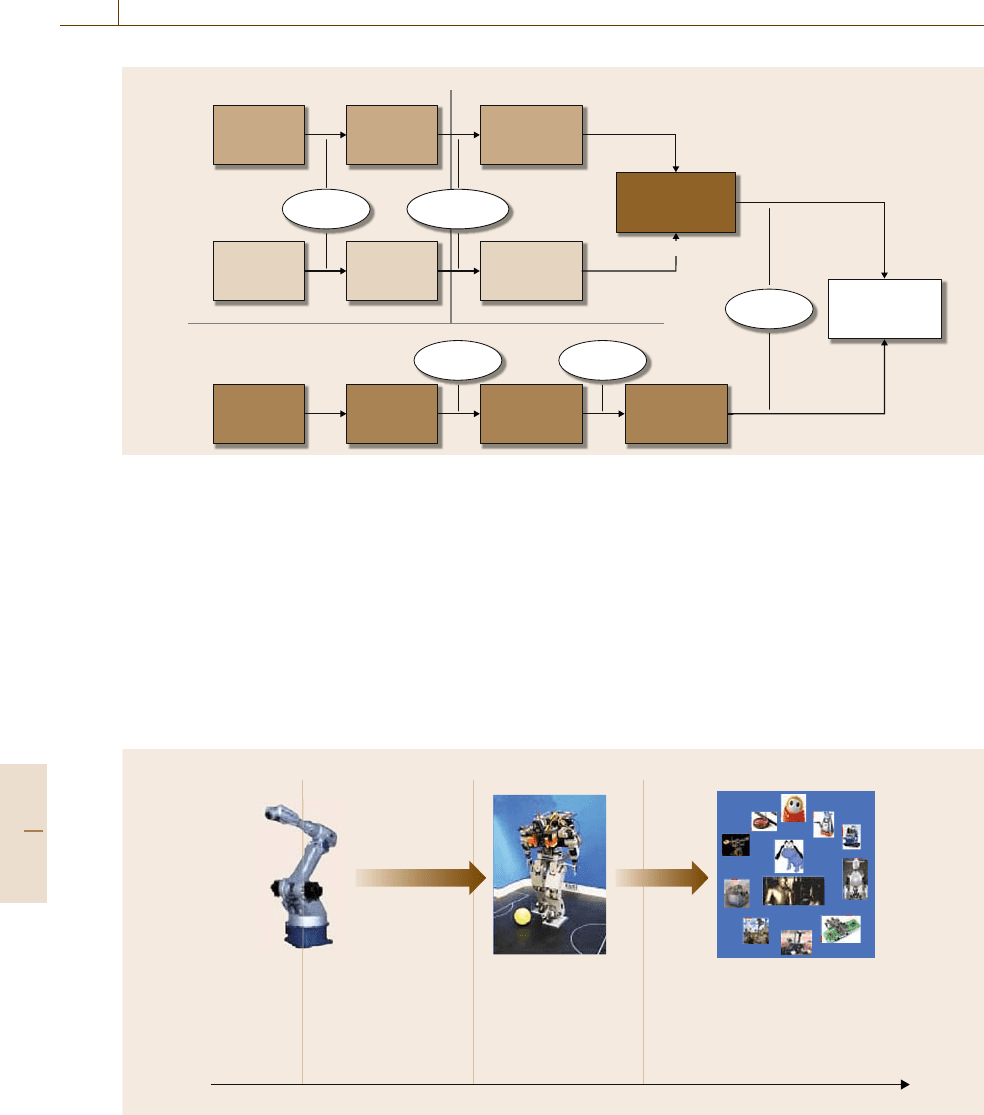Nof S.Y. Springer Handbook of Automation
Подождите немного. Документ загружается.


Automating Serious Games 73.2 Application Examples 1305
the profit earned and to the quality of decision-making.
Figure 73.4 describes the relationship between profit
and points for one of the scenarios. For illustration pur-
poses, a locally weighted regression line is shown. The
point calculations, however, are based on linear func-
tions as described below.
The profit range is divided into three segments:
upper, middle, and bottom. In each segment, a lin-
ear function describes the relationship between profit
earned and points given. This function is steep in the
middle and relatively flat at the tails, so the differentia-
tion among the top/low performers is less than among
those who are in the middle. The figure also shows
that submissions with the same profit received different
point scores; these fluctuations are due to differences in
the quality of decision-making scores.
In many ways, the simulation’s virtualworld mimics
real life. First, like in real life, there are multiple factors
with which students must interact. There are many po-
tential problems and no prepared solutions to counter
these. With the MBE Simulator software, what at first
appears to be a very simple scenario raises many com-
plicated interactions that are not as straightforward as
the student might think. Students have to understand
and get an overview of the whole supply-chain pic-
ture, which can be quite an overwhelming experience
formostofthem.
Also, in MBA programs, there is ever-increasing
pressure on getting better grades (and later convert-
ing better grades into better jobs), thus increasing the
temptation for cheating. As a result, much copying and
information exchange goes on between current and past
students. With traditional case studies, students can eas-
ily obtain the whole discussion to see how it was led
and managed. To try to prevent this, professors have to
regularly change, revise, and update teaching materials
just toprevent cheating. However, the principalproblem
with cheating, if we put aside the ethical considerations
and the added work to prevent it, is that students learn
nothing from it.
The simulator offers a solution to this problem by
providing an ongoing measurement of how much time
each student has spent on the simulator. Furthermore,
the professor can recreate the work done by the stu-
dents and see exactly what path they took and what
decisions they made. The students are also required
to submit an executive summary that describes their
management philosophy, tactics, and decisions. This as-
signment challenges students to reveal the way in which
they managed and why they did so, just like real-life
boards of directors are required to do. In class, stu-
120000–55000 –30000 –5000 20000 45000 70000 95000
Points
Profit
160
120
80
40
0
Fig. 73.4 Relationship between profit and points for one of the
scenarios. A LOWESS/LOESS locally weighted regression line is
shown
dents are asked why they made each decision. This is
completely different from the usual executive summary,
where only managerial slogans are used. Here the sum-
mary (10–12 pages total) provides real insights into the
company, and is a good indicator of the extent to which
the students understood the problem.
In sum, in the simulation most of the cheating-
related problems are eliminated, because it takes far
more effort to copy someone’s notes (and then answer
questions during the presentation of the results) than to
learn while running the simulator. In addition, the com-
plexity of the scenario allows for more than a single,
well-defined solution. Rather, the simulation provides
an ongoing search for solutions.
Learning with the simulator is ideal because it can
be used to illustrate, for example, inventory modeling
embedded in practice. In traditional problems (at the
end of textbook chapters), one paragraph describes the
problem, which is basically a mathematical problem,
and the students simply plug in the numbers and get the
answer. In the simulator, you can actually see (through
the graphs and through the mechanism itself) the im-
pact of changing a parameter on other parameters (such
as changing the order point or order quantity). Other
teaching topics that can be illustrated by the simulator
are: forecasting, master production scheduling, MRP,
bill of material, rough cut capacity planning, purchas-
ing, and choosing suppliers. In short, you can cover
every topic included in any operational management
course.
Part G 73.2

1306 Part G Infrastructure and Service Automation
MBE Simulations has also developed and cus-
tomized some virtual worlds for various organiza-
tions, including SAP, Amdocs, Kodak, Motorola, Bank
Leomi, Biosense (Johnson and Johnson), Lucent,
KPMG, Cellcom, Tnuva, Israel Military Industries, and
Orbotech.
73.2.2 L’Oreal e-Strat
L’Oreal e-Strat, the second example, is the biggest on-
line game used by universities and corporations. During
6months (=six decision rounds), which corresponds to
3years in real time, students in teams of three assume
the responsibilities of the chief executive office (CEO)
in a virtual cosmetics company. In order to achieve the
highest share price index, teams have to make decisions
about pricing, production volumes and capacity, logis-
tics, research and development, marketing, advertising,
and brand positioning after analyzing data and charts of
competitors and the market situation.
The students have to analyze a periodical report
after every round which contains information about rev-
enues, gains and losses, production quantity, capacity
utilization, market research studies, competitors, brand
perceptions, and benchmarking with other competitors.
Based on the information in the report, the students
have to make decisions in the following areas of the
company’s value chain: research and development, pro-
duction planning, brand management, distribution, and
corporate social responsibility. The decisions that the
students can make are limited by a budget, which is
determined by the performance of the last round.
Each area has its own additional, area-specific deci-
sions:
Research and development decisions have an im-
pact on customer satisfaction as well as on customer
demand.
In the production planning section, by changing
policies in terms of pricing, advertising, distribution or
even research and development, it is likely that demand
for certain products will vary strongly over time. High
prices for products or low prices for competing prod-
ucts normally lead to a decrease in demand. In order to
satisfy the demand of all customers and in order not to
produce products to stock, the management has to fore-
cast market demand and include it into the production
planning. If students assume too low a level of produc-
tion capacity, demand will not be met, which will have
a negative impact on the revenues of the company and
negatively affect the share price index (SPI).
In thee-Strat world, there are four distribution chan-
nels. Management has to allocate distribution and trade
marketing budget to each retail channel depending on
the shopping habits of the target group.
Among other considerations, the e-Strat structure
includes corporate social responsibility. Management
can decide if the company wants to invest in CSR
activities (e.g., water reduction, career tracking, and
kindergartens for employees). These investments will
lead to better company reputation and can have a posi-
tive impact on the SPI.
E-Strat is a complex business simulation that cov-
ers all areas of a company’s value chain. The game is
based on decision rounds that have to be submitted to
a central server that evaluates the results. However, al-
though thesimulation claimsto show allresponsibilities
of the CEO, there seems to be an emphasis on strategy,
marketing, and finance and less on operations.
73.3 Guidelines and Techniques for Serious Games
73.3.1 The Serious Game Solution
for e-Learning Characteristics
A serious game realm dictates a close to reality replica-
tion of a reduced size business that needs to be managed
by the trainee. The nature of learning business by doing
provides a unique characteristic of this virtual world.
The MERP and e-Strat solutions described above repre-
sent different approaches to serious games.
The comparison in Table 73.3 lists and explains the
differences between the two different types of serious
games: MERP and strategic business games such as
e-Strat.
MERP and e-Strat address Gee’s [73.22] five con-
ditions for learning through experience in the following
way.
73.3.2 The Virtual World
for Learning by Doing Characteristics
The main attribute of a serious game for teaching
business acumen is its holistic world view aimed at pro-
viding the learning by doing nature of gaming. As such,
the program should be able to simulate complex man-
agement situations that call for decision-making based
on detailed and transparent analysis of the situation at
Part G 73.3

Automating Serious Games 73.3 Guidelines and Techniques for Serious Games 1307
Table 73.3 MERP versus strategic business games such as e-Strat
Comparison criteria Dynamic management workshop
(MBE Simulations)
Business games (strategic or finance)
Decision type Realistic, daily-based events that affect the
organization’s results
Strategic (investments, penentration of
a new market, etc.)
Decision making Dynamic decision making. Choosing when
and which decision to make in parallel with
the evolving KPI status
Mandatory periodical set of decisions
(i.e., quarterly)
Competitive nature Teams are competing based on actual bench-
mark results. Scenarios are stochastic, reflect-
ing turbulent daily business life
Direct competition based on profit or
share price index reflected. The dynamic
is limited to competition cycles only.
Learning effectiveness Reinforced learning: Repeated runs of the
same organization
The game runs once, cannot be repeated
Learning scope Aimed at improving the learner’s effective
strategy execution abilities. Managerial and
business insights built upon tactical daily ex-
perience gained: Cause and effect, system
thinking, and accepting and dealing with un-
certainty
Focusing on strategic learning
hand. Such a program should incorporate the following
approaches to learning and education:
•
A pool of live dynamic case studies. These are
descriptions and scenarios which depict certain
management situations which often occur in real
life; for example, in the simulated world of MERP
and e-Strat, the trainees are given detailed data
on the virtual manufacturing organization includ-
ing: income statement, descriptions and details
of the products and their market segmentation,
details of the operational system, characteristics
of the raw-material suppliers, cash and credit
lines available, and various policies and ad hoc
decision-making capabilities. A wide variety of or-
ganizational settings in marketing, operational, and
finance can be described by different scenarios;
for example, a scenario’s cover story may read like
this: the company appears to be well managed; it
is doing all the right things. The order book is full;
it has good customer relations in that it delivers on
time and is therefore considered to be a reliable
vendor. Thecompany hasa goodmanagement infor-
mation system which provides detailed and varied
management reports. It has an MRP scheduling and
order system. It has reliable raw material suppliers.
It has the most modern and reliable machinery in
its operations division. It has everything, and is do-
ing everything, that a good manufacturing business
should be doing. However, it is losing money.
•
It should cover a virtual-world presentation of the
entire company and its environment. When the
trainee starts the simulated dynamic case study, the
trainee should be able to watch his/her strategies
unfold. The important point to note with this type
of management simulation is that the trainee is in
control and can set the rules, i.e., he/she can deter-
mine product prices, lead-time commitments made
to customers, operational policies, inventory levels,
suppliers to buy from, and so forth. In fact, ev-
erything that the trainee would normally plan and
control in his own business is available for planning
and control in the simulation.
•
It should be equipped with modern information
technology (IT) managerial solutions. As today’s
turbulentbusinesses are relyingheavilyon advanced
integrated information systems, the trainee should
be able to use such enablers in his/her practice. This
need dictates a presentation of an integrated infor-
mation system as well as a set of key performance
indicators (KPIs) for each department of the orga-
nization. An example of such a KPI presentation is
showninFig.73.1. These IT enabler tools present
dynamic changes in the company’s situation, and
trainees should respond to these changes by execut-
ing effective strategies.
Part G 73.3

1308 Part G Infrastructure and Service Automation
Table 73.4 Five conditions for learning through experiences
MERP e-Strat
Each MERP scenario is structured around very spe-
cific goals. Some of these goals serve as order
qualifiers (a certain level must be reached but going
beyondthe requiredlevel doesnot provide extra value)
and some as order winners (the more, the better).
The game is structured around one goal: winning the
contest, mainly by maximizing share price index.
In workshops and lectures, the simulation runs are in-
terpreted and the lessons learned extracted.
In between the various cycles, the results of the previ-
ous round are interpreted.
Throughout each scenario, learners can rely on a wide
range of key performance indicators (KPIs) to help
them recognize and evaluate their errors.
Throughout each cycle run, learners can rely on
a wide range of management reports to help them
recognize and evaluate their errors.
This game is aimed at improving learners’ effec-
tive execution rather than strategic decision making.
Therefore, the learners have a practically unlimited
number of runs in each scenario to apply and reapply
their previous experiences.
Focusing on strategic learning, the learners have six
decision rounds which correspond to 3years in real
time. The learning is gained upon the progress of their
results impacted by competitors’ decisions and not
only on their own effective execution.
While the simulation is run individually, the learners
are assigned to groups where the members’ experi-
ences can be shared. Also, independently of group
membership, the results of all individual runs are
displayed in a Top 100 list that provides further moti-
vation and feedback.
Learners are grouped into teams of three. The teams
have to decide on pricing, production volume and
capacity, logistics, research and development, market-
ing, advertising, and brand positioning after analyzing
charts on competitors and the market situation in order
to gain the highest share price index.
•
The decision-making nature of such a solution
should mimic that of real life. At any given point
in time, a large number of potential decisions are
available to the trainee and the challenge is to de-
cide not only on the decision to make but also on
the timing of the decision (that is, when to make
a decision). This feature distinguishes MERP from
traditional business games.
•
It should reflect a complex integrative and dynamic
environment: This realism is enhanced by the pro-
gram’s ability to introduce contingencies, such as
the uncertainty of the market, variations in the sup-
ply chain, maintenance downtime, and machinery
and plant breakdowns, to mention but a few. The
impact of these contingencies is coupled with the
impact of the strategic decisions already taken, and
integrated with the results to date, in exactly the
same way as in real life.
•
The program should describe a generic view of
a managed environment. In order to support real
insightful learning, a serious game should provide
a virtual-world description different from informa-
tion system solutions readily available from vendors
(i.e., packages from SAP, Oracle, etc.). This will
lead the trainee into the content path of learning
rather than focusing on is it real? type questions.
73.3.3 Supporting the Learning
by Doing Characteristics
Serious games for education/training should enable
learning by doing. This need dictates the following
main characteristics:
•
The role of the manager should be realistic. In
the assignment, the trainee should take the role of
a manager who has been called in to take over
a bankrupt company. He has lots of historical data
which can be used to develop strategic plans for
improving the situation, as well as to introduce
tactical and operational control mechanisms. The
game should provide all decisions and presentations
needed for carrying out the strategy developed.
•
It should be fully interactive and integrative. The
trainee should be able to stop the simulation when-
ever he/she feels the need to review the situation and
Part G 73.3

Automating Serious Games 73.4 Emerging Trends, Open Challenges 1309
think. The trainee should be able to change the poli-
cies, rules or decisions at any time and watch the
effect. The program also allows the trainee to se-
lect andsimulate a number of special activities, such
as expediting and order consolidation. The game
should describe a whole set of cause and effect
chains for each decision made, allowing the trainee
to explore and learnabout theinterrelations between
decisions and their outcomes as well as about their
impact on other business entities.
•
Ease of learning. The game should lead the trainee
along a short, relatively simple, path. Learning
should be about content rather than about the
mechanics of managing the simulation (as often
happens with traditional games).
•
It should reinforce learning. The solution should al-
lowthe traineeto repeat the same scenarioagain and
again, trying a different decision path every time.
In other words, this sensitivity analysis allows the
trainee to learn from his/her own experience.
•
Putting into practice things learned. The game
should guide and steer trainees in the right direc-
tions needed for gaining real experience and making
them learn through these experiences.
•
Simulate events that are close to reality. The game
should describe events in business and manage-
ment that are affected by uncertainties; for example,
product cost, product price, inventory level, and
product demand by customers are all events that
are dynamically and randomly changed in the back-
ground during simulation sessions. Consequently,
these events cause varied and sometimes unex-
pected situations to which each trainee must react.
•
Provide monitoring and evaluating. The game
should track trainee decisions and operating per-
formance as well as evaluate the decisions taken.
MERP, for example, monitors and displays the
decisions made by trainees. The consequences of
these decisions (e.g., cash flow, inventory levels,
and service levels) are continuously shown to group
members (running the same assignment), making
learning a shared experience. Additionally, a game
should provide ways to test the quality of the
trainee’s decisions and their effectiveness.
•
Team learning and collaboration. The game should
provide built-in platforms for chat and team com-
munication in a networked environment where
trainees can interactively communicate with each
other to share opinions and experiences about de-
tails and aspects of the simulator program in general
or about the specific program scenarios.
•
Learning from the previous experience. The game
should allow saving of simulation sessions as run
files. These run files should show the history of the
simulation sessions and should be replayed later by
the trainee and by professor. Session history exe-
cutable files contain all decisions, whether simulator
and/or trainee generated, exactly as in the originally
run simulation session, for trainees to review and
analyze separately.
73.4 Emerging Trends, Open Challenges
A significant trend in learning is the paradigm shift in
the role of trainee (Iverson, in [73.2]), from passive
to accountable active participation. Serious games offer
a solution to support this trend.
Unliketraditional business learning approaches,like
business games based on one size fits all solutions, there
is a need for tangible, content-specific business edu-
cation for motivated and engaged trainees. This need
calls for more content about the various business skill
areas and about industry-specific needs. Michael and
Chen [73.2] listed the required skills as follows: peo-
ple skills, job-specific skills, organization skills (that
is, how to utilize resources effectively, collaborate,
and focus on results, etc.), communication skills, and
strategy skills aimed at effective execution of strategy
needs.
Over time the generational structure of management
will change; the younger generation is becoming more
and more game-oriented. This new gamer generation is
more accustomed to calculated risk taking and needs
more challenging learning solutions (Beck and Wade,
in [73.2]).
Veen and Vrakking [73.23] argued that schools
of the future will have longer sessions (4 h periods)
and interdisciplinary themes rather than subject-specific
content. This trend in management learning will present
a challenge to provide more collaboration-based seri-
ous games that reflect and mimic the holistic realm of
a learning subject, and teachers should also be prepared
for this new environment [73.24]. Freitas [73.25]wrote
that training and education, both physically and con-
ceptually, will shift to new opportunities beyond the
Part G 73.4

1310 Part G Infrastructure and Service Automation
traditional classroom. Diverse communities with differ-
ent needs and cultures will present a new challenge for
serious games, learners and educators as well [73.26].
The last challenge in serious game learning is
the need to assess learning outcomes. Serious games
should be able to show that learning has occurred
and the extent to which the learning objectives have
been achieved [73.2]. This will elevate the character-
istics of the learning game to be directed implicitly
and explicitly toward learning goals. It will also re-
quire the development of assessment tools for serious
games.
73.5 Additional Reading
•
D. Cheek, H. Kelly: Designing an online vir-
tual world for learning and training, Fifth IEEE
Int. Conf. Wirel. Mob. Ubiquitous Technol. Educ.
(2008) pp. 208–209
•
T. Connolly, M. Stansfield: Games-based e-
Learning: Implications and challenges for higher
education. In: Social Implications and Challenges
of e-Business, ed. by F. Li (IGI Global, Hershey
2007)
•
B. Sawyer, P. Smith: Serious games taxonomy, The
Serious Games Summit at the Game Developers
Conference, San Francisco (2008)
References
73.1 T. Susi, M. Johannesson, P. Backlund: Serious
Games – An Overview (2007) http://www.his.se/
upload/48173/SeriousGames_overview.pdf
(accessed June 13, 2008)
73.2 D. Michael, S. Chen: Serious Games: Games that
Educate, Train and Inform (Thomson Course Tech-
nology, Boston 2006)
73.3 P. Breslin, C. McGowan, B. Pecheux, R. Sudol: Se-
rious gaming, Health Man. Technol. 28(10), 14–17
(2007)
73.4 H. Kelly, K. Howell, E. Glinert, L. Holding, C. Swain,
A. Burrowbridge, M. Roper: How to build serious
games, Commun. ACM 50(7), 44–49 (2007)
73.5 M. Zyda: From visual simulation to virtual reality to
games, Computer 38(9), 25–32 (2005)
73.6 B. Gros: Digital games in education: The design
of games-based learning environments, J. Res.
Technol. Educ. 40(1), 23–38 (2007)
73.7 P.M. Greenfield: Video games as cultural artifacts.
In: Interacting with Video, ed. by P.M. Greenfield,
R.R. Cocking (Ablex, New York 1996) pp. 35–46
73.8 P. Backlund, H. Engström, M. Johannesson: Com-
puter gaming and driving education, Proc. Work-
shop Pedagogical Design of Educational Games
affiliated to the 14th International Conference
on Computers in Education (ICCE 2006), Beijing
(2006)
73.9 M. Koepp, R. Gunn, A. Lawrence, V. Cunning-
ham, A. Dagher, T. Jones, D. Brooks, C. Bench,
P. Grasby: Evidence for striatal dopamine release
during a video game, Nature 393(21), 266–268
(1998)
73.10 M.J. Mayo: Games for science and engineering ed-
ucation, Commun. ACM 50(7), 30–35 (2007)
73.11 K. Corti: Serious Thinking,E.learningAge,March,
20-21 (2008)
73.12 M. Zyda: Creating a science of games, Commun.
ACM 50(7), 26–29 (2007)
73.13 D.W. Shaffer, K.D. Squire, R. Halverson, J.P. Gee:
Video games and the future of learning, Phi Delta
Kappan 87(2), 104–111 (2005)
73.14 D. Salomon, D.N. Perkins, T. Globerson: Partners in
cognition: Extending human intelligent technolo-
gies, Educ. Res. 20(3), 2–9 (1991)
73.15 A. Agostino: The relevance of media as artifact:
Technology situated in context, Educ. Technol. Soc.
2(4) (1999)
73.16 D. Shaffer: Epistemic games, Innovate 1(6) (2005),
http://www.innovateonline.info/index.
php?view=article&id=79 (accessed April 18, 2008)
73.17 D.A. Schon: Educating the Reflective Practitioner:
Toward a New Design for Teaching and Learning in
the Professions (Jossey-Bass, San Francisco 1987)
73.18 J. Gee: Situated Language and Learning: A Critique
of Traditional Schooling (Rutledge, London 2004)
73.19 K. Squire: Game-Based Learning: Present and Fu-
ture State of the Field (Univ. Wisconsin-Madison
Press, Madison 2005)
73.20 J. Bransford, A.L. Brown, R.R. Cocking: How People
Learn: Brain, Mind, Experience and School (Na-
tional Academy, Washington 2000)
73.21 R.K. Sawyer: Analyzing collaborative discourse. In:
The Cambridge Handbook of the Learning Sciences,
ed. by R.K. Sawyer (Cambridge Univ. Press, Cam-
bridge 2006) pp. 187–204
73.22 J.P. Gee: Learning and games. In: The Ecology of
Games: Connecting Youth, Games, and Learning,
Foundation Series on Digital Media and Learning,
Part G 73

Automating Serious Games References 1311
ed. by K. Salen (MIT Press, Cambridge 2008) pp. 21–
40
73.23 W. Veen, B. Vrakking: Homo Zappiens: Reshaping
Learning in the Digital Age (Network Continuum,
London 2006)
73.24 K. Becker: Digital game-based learning once re-
moved: Teaching teachers, Br. J. Educ. Technol.
38(3), 478–488 (2007)
73.25 S. de Freitas: Learning in immersive worlds, A re-
view of game-based learning, http://www.jisc.ac.
uk/whatwedo/programmes/elearning_innovation/
eli_outcomes.aspx(accessed April 28, 2008)
73.26 L.Pannese,M.Carlesi:Gamesandlearningcome
together to maximise effectiveness: The challenge
of bridging the gap, Br. J. Educ. Technol. 38(3),
438–454 (2007)
Part G 73
“This page left intentionally blank.”

1313
Automation i
74. Automation in Sports and Entertainment
Peter Kopacek
A service robot has to be intelligent, mobile, and
able to cooperate with other robots and devices.
We are on the way towards multirobot systems
in which several robots, called multiagent sys-
tems (MAS), will act in a cooperative way together
a common task. One of the newest application ar-
eas of service robots and especially MAS is the field
of entertainment, leisure, and hobby. People have
more free time, and modern information technolo-
gies lead to loneliness of humans (teleworking,
telebanking, teleshopping, etc.). Entertainment
robots are expected to be one of the real frontiers
of the next decade.
In this chapter a short description of such
robots will be given, including some application
examples. Due to the broad range of possible
applications of robots in entertainment, leisure,
and hobby, the following classification has been
made in order to give this contribution a basic
74.1 Robots in Entertainment, Leisure,
and Hobby ...........................................1315
74.1.1 Definitions ..................................1315
74.1.2 Categories ...................................1315
74.1.3 Examples ....................................1315
74.2 Market.................................................1330
74.3 Summary and Forecast ..........................1330
74.4 Further Reading ...................................1331
References ..................................................1331
structure: robot construction sets, sports assistants,
promotion and public relations, robots in the en-
tertainment industry, personal robots, humanoid
robots, and competition robots.
As an example, robot soccer competitions will
be described in more detail. Finally an outlook on
future development trends will be given.
There are three starting points for the development of
intelligent robots (Fig.74.1):
•
Conventional stationary robots
•
Autonomous guided vehicles (AGVs)
•
Walking machines.
Stationary industrial robots equipped with external sen-
sors are used today, e.g., for assembly and disassembly
operations, fueling of cars, etc. and were the first intel-
ligent robots.
Mobile platforms with external sensors (AGVs)
have been commercially available for some years and
cover a broad application field. Mobile platformsare the
real roots of service robots.
Walking machines or mechanisms have been well
known for some decades. Usually they have four to six
legs (multiped) and only in some cases two legs (biped)
– from the viewpoint of control engineering walking on
twolegsis averycomplex(nonlinear) stability problem.
Biped walking machinesequipped withexternal sensors
are the basis for humanoid robots. Some prototypes of
such robots are available today.
To give an idea about further developments,
Fig.74.1 shows possible developmenttrends inrobotics.
We are now on the way from unintelligent industrial
robots via intelligent industrial robots to intelligent mo-
bile – including humanoid – robots to third-generation
advanced robotsable to interact and work symbiotically
with us.
Robots in the 21st century will be used in all areas
of modern life. The major challenges are:
•
To develop robotic systems that can sense and inter-
act usefully with humans
•
To design robotic systems able to perform complex
tasks with a high degree of autonomy.
Part G 74

1314 Part G Infrastructure and Service Automation
Advanced
industrial
robots
(Assembly)
External
sensors
Human–robot
interaction
Service
robots
(fixed base)
Service robots
(mobile
manipulators)
(Fueling)
(Fetch & carry)
Industrial
robots
(Pick & place)
Intelligent
AGVs
(Flexible
transportation)
Service
robots
(mobile platforms)
(Intell. wheelchair,
helpmate)
AGVs
ManipulationLocomotion
(Transportation)
Stability
Multiped
walking
mechanisms
Biped
walking
mechanisms
External
sensors
Networking
Humanoid
robots
Walking
mechanisms
Factory environment Public and home environment
Tele-
robotics
Fig. 74.1 From industrial to service robots (after [74.1])
In the same way that mobile phones and laptops
have changed our daily lives, robots are poised to be-
come a part of our everyday life. The robot systems of
the next decades will thus be human assistants, help-
ing people do what they want to do in a natural ad
intuitive manner. These assistantswill include:robot co-
workers in the workplace, robot assistants for service
professionals, robot companions in the home, robot ser-
vants and playmates, and robot agents for security and
space.
First generation
Industrial robot Personal robot
1960
Second generation
2000
Third generation
2010
• Manufacturing
& automation
• Robust, fast, precise
• Edutainment,
welfare, etc.
• Intelligence, human–
robot interaction (HRI),
mobility
Ubiquitous robot
• U-services
• Networked, calm,
seamless,
context-aware
Fig. 74.2 Development trends in robotics [74.2]
The role of these robots of the future could be
improved by embedding them into emerging infor-
mation technology (IT) environments characterized by
a growing spread of ubiquitous computing and commu-
nications and of ad hoc networks of sensors forming
what has been termed ambient intelligence.
Currently available robots are far from this vision
of the third generation, being able to understand their
environments, their goals, and their own capabilities or
to learn from their own experiences.
Part G 74
